About Us
We are the hospital of the Universidad de Navarra.
With over 3,800 professionals working exclusively at its headquarters in Pamplona and Madrid, the Clínica Universidad de Navarra is a leading academic and research hospital in the sector of personalised medicine, according to the Anglo-Saxon model.
A recognised institution for both its teaching and research work, the prestige of its professionals, and its trajectory in the diagnosis and treatment of highly complex pathologies, the Clínica Universidad de Navarra is a high-resolution hospital characterised by its diagnostic speed owing to its multidisciplinary work and the acquisition of the latest technology to offer care in 46 different medical and surgical specialties.
Founded by Saint Josemaría Escrivá de Balaguer within the University of Navarra in 1962, the Clinic has developed a medical care model focused on the needs of the patient and their family, which constitute the center of its activity. On this wise, the research has become a way to guarantee access to the most innovative treatments, whereas the teaching has turned into a mean for generating and transferring the knowledge to society.
The Clinic, for the ten time in a row, has been named the private hospital with the best reputation in Spain, according to the MRS’s ranking, and is listed among the top 50 hospitals worldwide being the first Spanish private medical centre within this ranking, according to world-famous Newsweek magazine.
Learn more about us
We are a high-resolution hospital characterised by its diagnostic speed and treatment of diseases. We follow a model of interdisciplinary medicine where the patient constitutes the center of all activity, biomedical research and teaching.
We are the hospital of the Universidad de Navarra, a non-profit medical and academic institution that reinvests its surpluses in continuous improving of patient’s care.

Patients take center stage
With a commitment to personalized medicine and a focus on patients and their families, we employ professionals who work exclusively for us.

We produce knowledge
We are the Clínica Universidad de Navarra. In addition to treating patients, our specialists undergo continuous training, while also conducting research and teaching.

Research for a cure
Our specialists conduct research to provide patients with new solutions. We want to use continuous research to turn the tide against disease.

Always as a team
The collaboration of specialists in multidisciplinary teams to tackle disease comprehensively and to offer each patient the best treatment is part of our DNA.

Unique medical technology in Spain
The Hospital has the most advanced equipment available for diagnosing and treating all diseases.

High-performance medicine
The most advanced diagnostic technologies and multidisciplinary work facilitate diagnosis in the first 24–48 hours and treatment within the first 72 hours.
Life committed
Patient
Centered
The personalised and comprehensive medical treatment to both the patient and their families is our main hallmark.
Our management team
Board of Directors of the Clinic

Joseba Campos Capelastegui
General Director

Álvaro Zabala Hartwig
Director
Madrid Campus

Dr. Nicolás García González
Chief Medical Officer
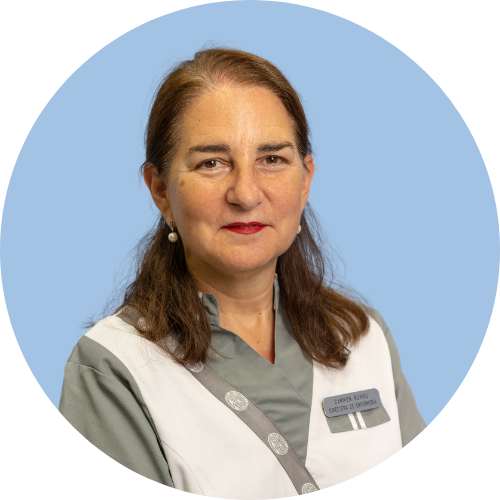
Carmen Rumeu Casares
Chief Nursing Officer
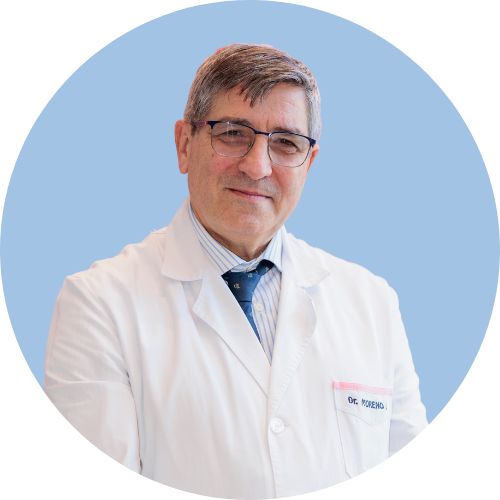
Dr. José Manuel Moreno
Medical Director
Madrid Campus
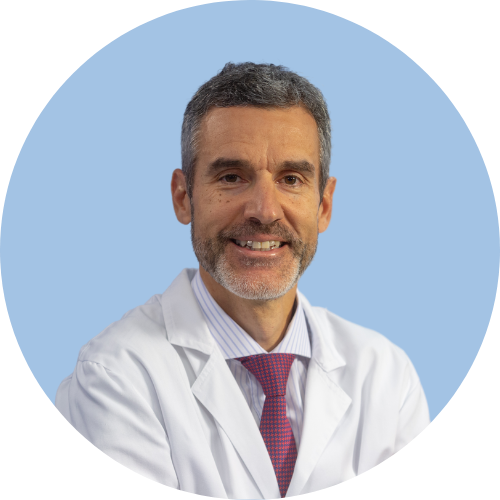
Dr. Víctor Valentí
Medical Director
Pamplona Campus

Dra. Marta Ferrer
Dean. School of Medicine
Universidad de Navarra

Carmen Ferrer de Cabo
General Secretary
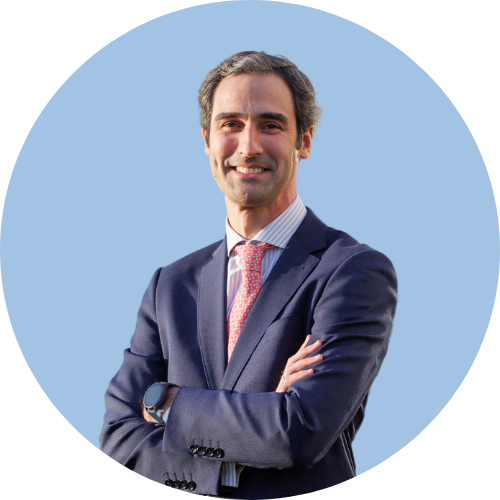
José María Gutiérrez de Cabiedes
Development Director

Luis Gaytán de Ayala
Project Manager

Eduardo Ecay
Manager
Executive Committee Madrid
Clínica Universidad de Navarra

Álvaro Zabala Hartwig
Director

Dr. José Manuel Moreno
Chief Medical Officer
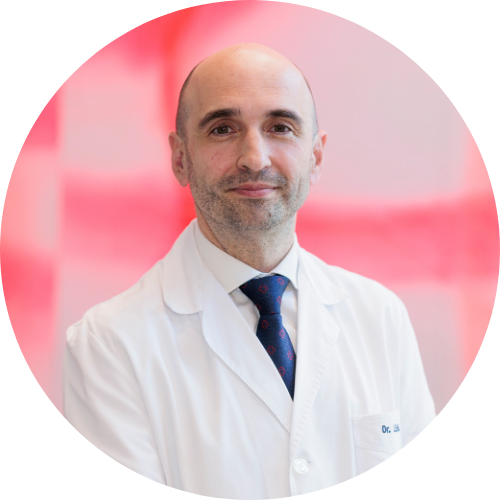
Dr. Ignacio Leal Lorenzo
Deputy Chief Medical Officer

Teresa Llácer Pla
Chief Nursing Officer
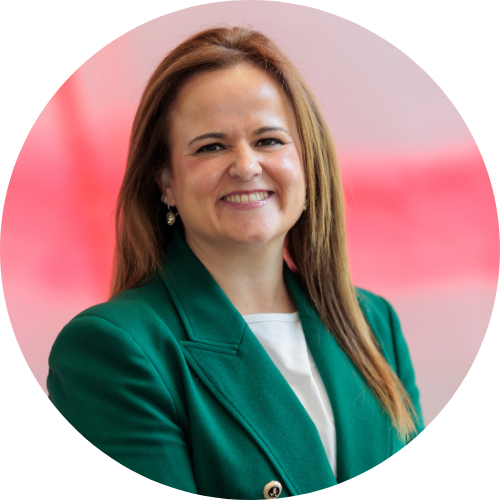
Rosana Pérez Villarrubia
Managing Director

Maite Ahugetas Palao
Human Resources Director

Pedro Villarino Marzo
Chief Operating Officer
Executive Committee Pamplona
Clínica Universidad de Navarra

Joseba Campos Capelastegui
General Director

Dr. Nicolás García
Medical Director

Dr. Víctor Valentí
Medical Director
Pamplona Campus

Carmen Rumeu Casares
Chief Nursing Officer

Pablo Duart
Chief Operating Officer

Patricia Fernández-Micheltorena
Managing Director
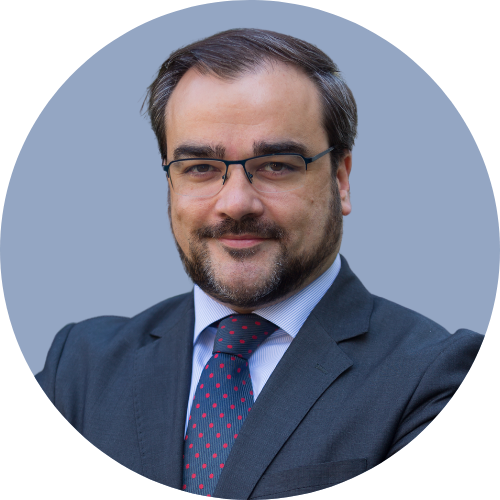
Jesús Rodríguez Polo
Human Resources Director
More about the Clinic
THE PATIENT HAS A RIGHT
- To the free choice of a doctor.
- To be respected in his or her personal privacy and to receive a proper and human treatment.
- To receive timely and responsive clinical attention that meets his or her needs, according to the current level of medical science.
- To receive attention conforming to the norms of professional ethics.
- To have a doctor as interlocutor among the other healthcare team members, who will respond to
patient’s doubts and concerns, explain the nature and purposes of the care provided and assume the responsibility of its coordination. - To receive true and understandable information about his or her disease, the different options of
treating it, including the results which may be expected, and the possible adverse effects. - To participate in the decisions that concern them regarding the choice of treatment, to give and
withdraw their consent for its implementation. - To refuse to receive information, and to abstain from the making of decisions, as long as this
does not harm anybody. In these cases, the patient will designate a person to transfer those
rights to. - To be accompanied during the healthcare process by people of trust, and to choose who should be present during the tests, whenever the clinical circumstances permit this.
- To access the data of his or her medical records.
- To keep the personal data highly confidential. It will not be revealed without a previous
authorization. - To be respected in his or her decision, taken in advance and expressed in a document, about the care and treatment in the event of possible situations in which the patient could not express his or her will.
- To seek a second opinion to review the diagnosis and the treatment plan.
- To receive or refuse a spiritual and religious attention.
- To consent or refuse to participate in research projects, without this decision affecting the
quality of care. - To consent or refuse to participate in teaching activities directed to students of Medicine or
Nursing. - To make complaints or suggestions about both workers and services and to receive a prompt
feedback.
THE PATIENT’S RESPONSIBILITIES ARE
- To get to know the patient’s rights and the responsibilities, as well as to exercise and comply with them reasonably.
- To provide truthful and complete information about his or her disease and the treatments that he or she has followed, in order to receive an adequate care.
- To obtain the necessary information about medical interventions, so to be able to make aconscious and deliberate decision of whether to consent their implementation or not.
- To accept the consequences of his or her free and informed decisions.
- To respect and assume the general measures established in the Clinica, in order to promote health and prevent disease.
- To respect the people, the facilities, the schedules and the material assets of the Clinica.
- To assume the financial commitments of assistance acquired at the Clinica.
- To avoid behaviors which may interfere with the wellbeing and the rights of the other patients within the Clinica.
September 2018
I. Introduction
- Essential and inseparable elements of the work at the University of Navarra Clinic are service to the sick, respect for their dignity and the quality of care required by its university character. In accordance with the Ideology of the University of Navarra, all those who work at the Clinic must act in accordance with the norms of professional ethics, in conformity with the moral teachings of the Catholic Church.
- All those who work in the Clinic must know and commit themselves to comply with the norms of this Code of Ethics, which they freely and responsibly adopt.
II. Vocational and Professional Sense of Work
- The vocational sense of work at the University of Navarra Clinic requires the improvement of professional competence through continuous study and respect for the ethical and deontological norms of one's profession.
- In accordance with the teachings of St. Josemaría Escrivá, the first Chancellor of the University of Navarra, there are no inferior tasks at the University Clinic of Navarra. The work as a whole gives meaning to the various functions and demands quality work from everyone, which perfects and dignifies the person.
- The positions of government must be understood as an opportunity for service and exemplarity, and even the appearance of authoritarianism or personalism must be avoided. Government is collegial at all levels of decision making.
- Cordiality, mutual respect and loyalty should characterize the human and professional relationships of those who work at the Clínica Universidad de Navarra. Equal opportunities, legitimate pluralism, individual initiative and active participation in internal management are encouraged, and the right to associate for collective purposes is recognized, without prejudice to the common good.
- Disagreements on scientific, professional, ethical or organizational matters shall be handled with respect, maturity and cordiality. Conflicts shall be resolved with the help of a mediator, appointed by the Board of Directors, whose moral authority is recognized by those involved; or by requesting the opinion of the Ethics and Deontology Commission; or by referring the matter to the Board of Directors.
- Teamwork is a characteristic feature of the institutional style of the Clínica Universidad de Navarra and everyone must be available to participate in commissions or work groups, to the extent permitted by the contracted dedication regime.
- The professional style of the Clinic requires that the appropriate means be used to reach the diagnosis of each patient with the minimum risk, in the shortest time, at the lowest cost and under the least burdensome conditions for the patient. To achieve this, physicians must respond promptly to consultations from other colleagues.
III. Service to the patient
- All of the Clinic's activities - assistance, research, etc. - must rigorously respect the life of the person from the beginning of existence at fertilization to its end in natural death, as well as the principles of Catholic morality on aspects related to human sexuality and procreation.
- The inspiring principle of the work at the Clínica Universidad de Navarra is respect for the dignity and freedom of the human person, created in the image of God, redeemed by Christ and destined to eternal life, without discrimination. For this reason, everyone must take into consideration the circumstances of each case and maintain a personal relationship with the patient that seeks to satisfy his or her legitimate human and religious aspirations.
- The patient has the right to receive sufficient information from the doctors and nursing staff, and to decide what is to be passed on to relatives and friends. This right corresponds to the parents of minors, although children and adolescents are also informed to the extent required by their maturity.
- In the relationship between doctor and patient, the confidentiality required by professional secrecy must be maintained. All are obliged to jealously maintain official silence and to observe security measures regarding the custody, access and circulation of medical records and personal data.
- The patient has the right to receive delicate and attentive treatment; to delicate protection of his personal and bodily privacy, especially in the course of examinations or when he is unable to take care of himself; and to detailed information on the economic cost of medical care, which avoids useless expenses or unnecessary interventions.
- The freedom of the patient to refuse or suggest modifications to the diagnostic or therapeutic interventions proposed to him/her must be respected, provided that they are compatible with medical ethics and the requirements of the dignity of the person.
- Treatments in the field of psychiatry and neurology will respond to the principles of Christian anthropology.
- When the services of several physicians are required to improve the care of a patient, one of the physicians assumes responsibility for coordinating the care and representing the team to the patient.
- The terminally ill should be offered the palliative treatment that best contributes to alleviating their suffering and maintaining their dignity, without resorting to useless, disproportionate or aggressive treatments from which only a precarious and painful prolongation of life can be expected. They will also be offered appropriate spiritual assistance, if they so desire.
- Professional ethics oblige us to recognize the accidents or errors that may occur, to study their causes and to put in place the appropriate means to avoid their repetition. Sometimes these objectives cannot be achieved without the cooperation of the patient and those close to him or her, with whom the matter should be discussed with sincerity and simplicity, after making the appropriate apologies.
- Patients, their relatives and those who work at the Clinic may request the opinion of the Clinic's Ethics and Deontology Committee on the problems that affect them.
IV. University character of the institution
- Research is an essential requirement of any university medical institution. The Clínica Universidad de Navarra offers its patients quality medical care that incorporates the most recent advances in science and medical art, after they have been contrasted and evaluated in conscience by the medical team and by the Ethics and Deontology Committee. The incorporation of new techniques is done to the extent that they provide reasonable guarantees of clinical efficacy, exclude disproportionate risks and respect human dignity.
- Prior approval of the Board of Directors of the Clínica Universidad de Navarra, with the favorable opinion of the Medical Ethics and Deontology or Research Ethics Committee, is required for the implementation of both innovative therapies and new research, therapeutic or otherwise.
- The Departments and Services of the Clínica Universidad de Navarra continually evaluate procedures to improve their actions and, after appropriate critical reflection, consider whether new diagnostic instruments or techniques should be incorporated.
- The university character of the Clinic requires teaching attention to doctors in training and to students of Medicine, Nursing and other health professions. Their presence stimulates the human quality and technical competence of the work carried out at the Clinic.
- The patient has the right to decide freely whether or not to collaborate in the teaching, and to determine the nature and duration of his collaboration. His or her consent or that of his or her family must be requested on each occasion, and the teachers and students will express their gratitude in any case.
- The research projects on human beings shall comply with the legal regulations and with the contractual commitments or agreements signed in each case.
- They may only begin once they have been authorized by the Board of Directors of the Clínica Universidad de Navarra, with the opinion of the Research Ethics Committee, which, in addition to ensuring the scientific quality of the studies, must watch over the safety and dignity of the subjects who participate in them. Before being included in a research project, patients must validly give their consent, after being duly informed.
- The university vocation of those who work at the Clínica Universidad de Navarra leads them to unreservedly share their knowledge and to recognize the irreplaceable value of the observations of others. With all colleagues, whether or not they are part of the faculty of the University of Navarra, they maintain a friendly and cordial professional relationship.
Updated in March 2019.
Mission
The Clínica Universidad de Navarra is a centre belonging to the Universidad de Navarra, inspired by Christian principles. Its mission is to provide excellent clinical practices by integrating care, research and teaching and by focusing all activity on the patients and their needs.
The Clínica seeks the improvement of its professionals through well-done clinical practice as a way of serving society
Visión
The vision of a patient-centred medicine
- To add value to each patient and to society by collaborating closely with a number of different health agents.
- To be an international benchmark centre in both medical care and research.
- To provide responses for each patient through personalized treatment.
- To work to be accessible to the greatest number of people.
- To have collaborators and benefactors that would allow financing innovative projects, promoting research and treating patients with fewer resources.
- To be a friendly hospital that optimizes the care and administrative processes in favor of both the patient and the professionals.
- To be an innovative hospital in teaching and specialized training.
- To work in an integrated and joint way with the other centres within the University.
- To achieve that all professionals can identify themselves with the common project and feel proud of it.
- To be a safe centre with a culture of quality and teamwork in which practice is based on evidence.
1.- Freedom:
This is a basic principle of academic and professional life, research work and clinical practice.
2.- Work:
It manifests the dignity of the person and entails the aspiration to excellence in the performance of tasks and attention to detail. It also seeks to contribute knowledge by putting it at the service of people.
3.- Respect:
It implies respect for patients and their families and, especially, respect for life. This term also refers to patient confidentiality and privacy at all times.
This value implies the ability to listen, correct behavior, civic spirit and care of the facilities.
4.- Interdisciplinarity:
The practice of medicine is developed through the multidisciplinary approach, teamwork of different professionals and compassion for the patient's needs. All this, requires a dialogue between different professionals from different areas, health professions, scientific specialties, etc.
5.- Responsibility:
This is one of the skills that characterizes the Clínica Universidad de Navarra and which is intended to be transmitted to professionals in training. It includes the commitment of professionals in the care of each patient and the initiative to solve their needs.
6.- Service:
It aims to contribute to the material and moral improvement of society. Professionals put their knowledge, competence and human values at the service of the patient and other professionals.
The patient is a person in need who should receive all possible help to ensure their welfare.


